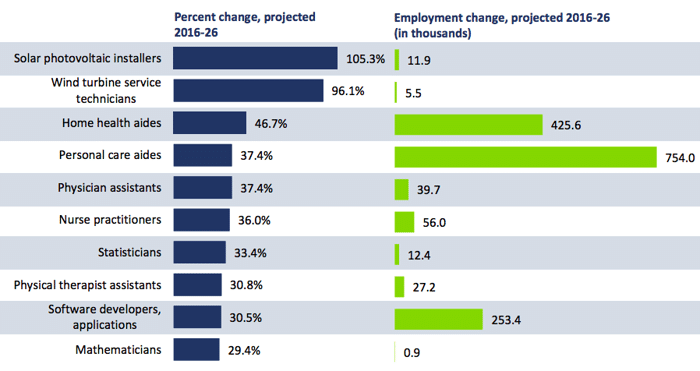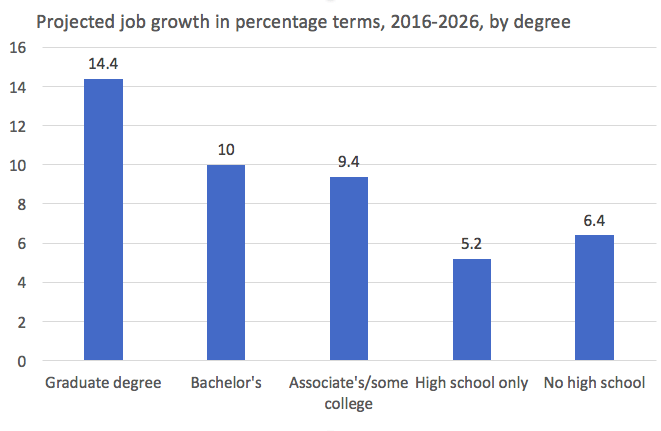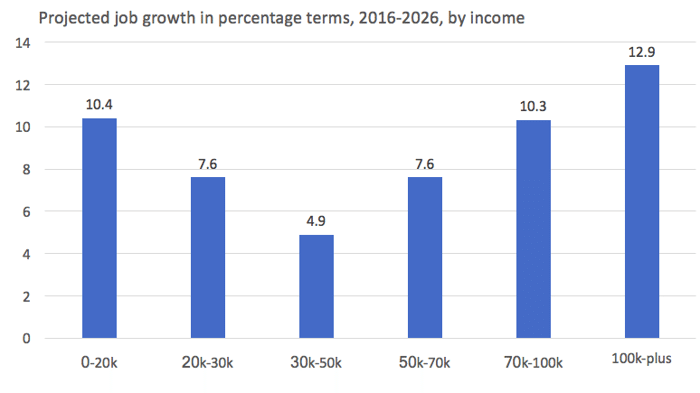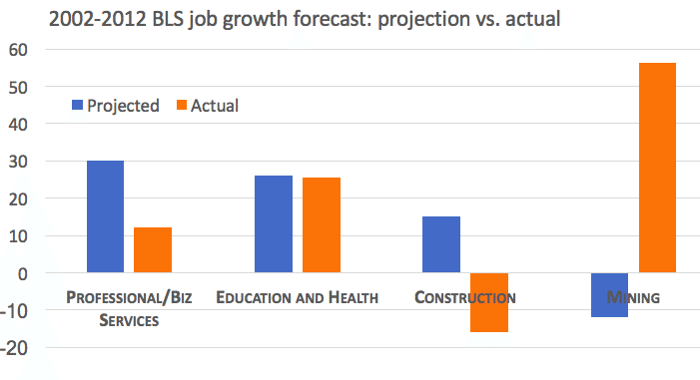Connecting state and local government leaders
A blockbuster report from government economists forecasts the workforce of 2026—a world of robot cashiers, well-paid math nerds, and so (so, so, so) many healthcare workers.
Manufacturing will fall. Retail will wobble. Automation will inch along but stay off the roads, for now. The rich will keep getting richer. And more and more of the country will be paid to take care of old people. That is the future of the labor market, according to the latest 10-year forecast from the Bureau of Labor Statistics.
These 10-year forecasts—the products of two years’ work from about 25 economists at the BLS —document the government’s best assessment of the fastest and slowest growing jobs of the future. On the decline are automatable work, like typists, and occupations threatened by changing consumer behavior, like clothing store cashiers, as more people shop online.
The fastest-growing jobs through 2026 belong to what one might call the Three Cs: care, computers, and clean energy. No occupation is projected to add more workers than personal-care aides, who perform non-medical duties for older Americans, such as bathing and cooking. Along with home-health aides, these two occupations are projected to create 1.1 million new jobs in the next decade. Remarkably, that’s 10 percent of the total 11.5 million jobs that the BLS expects the economy to add. Clean-energy workers, like solar-panel installers and wind-turbine technicians, are the only occupations that are expected to double by 2026. Mathematicians and statisticians round out the top-10 list.

redictions to write about. They can help college students pick their major—for example, the projected growth of statisticians augurs well for math—and shape debates about government spending.
At times, however, it seems like nobody at the highest level of government has any clue these reports exist. When President Donald Trump talks about the future of the economy, he often praises steel workers and manufacturers. But manufacturing is the only major industry projected to decline in the next decade, and steelworkers are projected to add just 9,000 jobs in the next 10 years. That is about the same as the projected increase in drama and music professors at private colleges, an occupation that no politician considers symbolic of the American idea (sad!).
Here are the four major themes of the employment projections.
1. Health care will take over—or, continue its long takeover of—the economy.
The funny thing about getting old is that, outside of Christopher Nolan films, it is a one-speed phenomenon, which does not yield itself to sudden and surprising news headlines—e.g., Scientists Stunned As Springfield’s Population Ages 10 Years in One Weekend. But the greying of the U.S. is quietly one of the nation’s most important economic events.
Aging explains, for example, why jobs are projected to grow 50 percent slower in the next decade than they did between 1996 and 2006. It explains why, since the mid-1990s, the share of the labor force over 55 will have doubled by the mid-2020s—from 12 percent to 25 percent. It may explain the nation’s declining productivity. And it explains why the future of the economy is health care.
Health care’s statistical dominance of the emerging labor force is stunning. Of the 10 jobs projected to grow fastest by percent, five are in health care and elderly assistance. Those five occupations—personal care aides, home health aides, registered nurses, medical assistants, and nursing assistants—account for almost one-fifth of the net new jobs to be created by 2026. Since it’s difficult to automate (and impossible to offshore) the tactile work of caring for a fragile elderly person, these jobs would seem resistant even to the most aggressive implications of AI and machine automation of the labor force.
2. It’s the end of retail … as America’s most dependable engine of job growth.
In the second half of the 20th century, American stores replaced factories as the most important place for job growth. The retail workforce tripled between 1940 and 2000. Cashiers and retail salesperson are two of the most common jobs in the country. But in the last few years, as online retail has grown, retail has taken a beating, with one department store after another declaring bankruptcy.
The BLS projects that retail’s heyday is over. They make the rather astonishing projection that as e-commerce grows and automated check-out machines proliferate, the number of cashiers will actually decline slightly in the next 10 years, by about 30,000 jobs. That's not catastrophic—a 0.8 percent drop—but it's an indication of how the economists think about the effects of technology and shifting consumer tastes. The cashier, following the path trod by the manufacturing worker, is in structural decline.
In some cases, I think the retail projections aren’t pessimistic enough. For example, the economists project that jobs at clothing stores and department stores will shrink by about 150,000 in the next ten years. Okay, that’s pretty steep. But the economy has already shed 120,000 of those jobs in just the last two years.
Some of these jobs will shift to warehouses to fulfill online orders. But not all, says Frankie Velez, an economist at the BLS. “A lot of technology is already in fulfillment centers to move and sort goods without human assistance,” he said. Even though these jobs have been a bright spot in the last few years, the BLS projects that warehousing employment won’t grow much faster than the rest of the labor market in the next decade.
3. Inequality—by income, education, and geography—will continue to grow.
Today, rich, college-educated Americans living in or near the largest cities are thriving. Poorer, less educated Americans living in rural areas are falling further behind. Meanwhile the middle class, once composed of non-college-educated men working in manufacturing and construction, is being hollowed out by globalization and technology.
The next 10 years may exacerbate inequality by earnings and geography. Jobs for people with bachelor’s degrees are projected to grow twice as fast as jobs for people with just high school degrees.

Meanwhile, there won’t be a shortage of either extremely low-paid work or highly paid work. But jobs earning between $30,000 and $50,000 are projected to grow slowly, as employment flags in manufacturing and retail.

The jobs of the next decade will also be polarized by geography, the economist Jed Kolko said in his analysis of the BLS figures. Jobs in big cities and their suburbs are projected to grow faster than in rural areas. Meanwhile, in the swath of land stretching from the Mississippi River to the Blue Ridge Mountains, from the tip of Michigan to the Louisiana bayou, a large share of Americans are working in occupations that are projected to shrink, many of them in manufacturing. These are areas that tended to vote for Trump in the lection.
4. Automation will take a nibble, not a bite, out of the economy.
Self-driving cars might be the talk of Silicon Valley and auto manufacturers. But the BLS doesn’t see their impact in the labor market until after 2026. In their projections, heavy truck-driving will add 114,000 new jobs in the next decade, growing at nearly the same rate as the economy. Delivery service drivers are projected to grow even faster the labor force.
Why don’t these economists think that autonomous vehicles are set to replace truck drivers? “We thought that autonomous truck driving would be a little farther out in our projections,” said Teri Morisi, branch chief of the Division of Occupational Employment Projections. “Technological advancements like platooning and braking assistance will make truck driving safer and more energy efficient, but they shouldn’t change the demand for truck driving.”
* * *
This raises a larger question: Is the government any good at predicting the future? The BLS’s early-century forecasts of the next decade didn’t anticipate the Great Recession, which restrained overall job growth and decimated construction, or the natural gas revolution, which created a mining boom. On the other hand, it nailed the growth of education and health care within a percentage point.

The big takeaway? The BLS is good at combining publicly available information and mainstream economic thought to project the growth of the labor force and the government, on which much of education and health care work depends. But very few organizations can reliably predict surprising events.
Economic and technological shocks are inherently unpredictable. To take this report as gospel requires one to believe that the next decade will be significantly less surprising (and, perhaps, significantly more boring) than the last one. One can pray.
Derek Thompson is a senior editor at The Atlantic, where this article was originally published.

NEXT STORY: Which Major U.S. Cities Have the Highest Sales Tax Rates?



